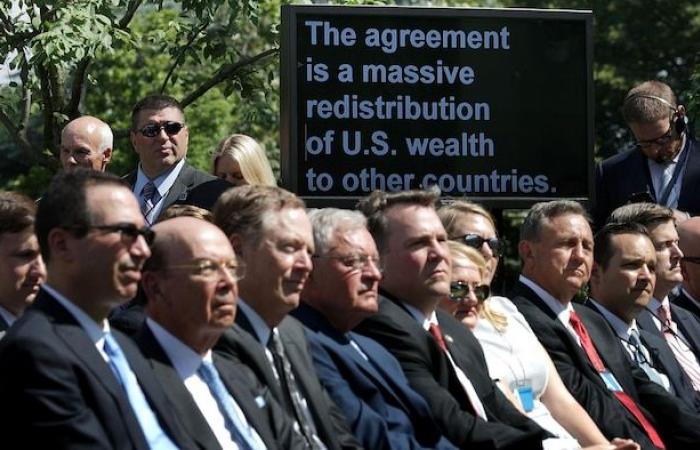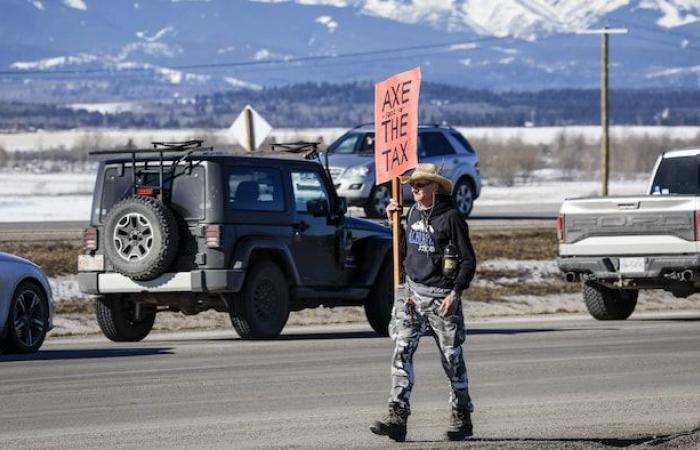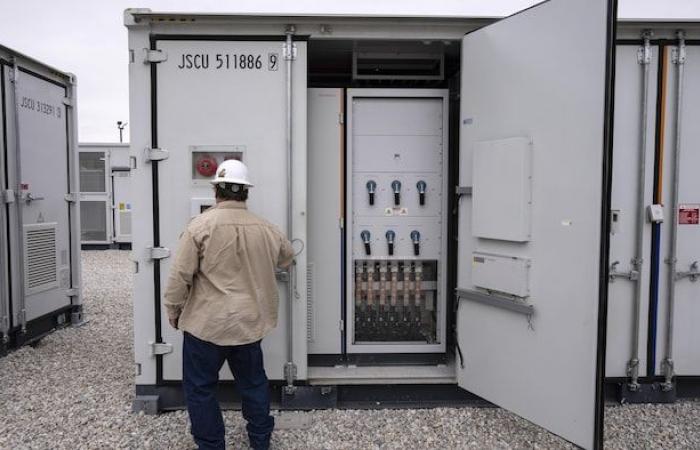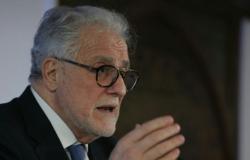With a stroke of the pen as only he has the style, Donald Trump did what he said he was going to do.
For a second time in less than a decade, he initiated the withdrawal of the United States from the Paris Climate Agreement, which he described asunfair scam
.
Donald Trump wants to give back l’or liquide
of the American subsoil – oil – its letters of nobility: it wants unleash American energy
drilling fossil fuel wells at all costs (Drill, baby, drill
) and cut funds for renewable energy and electric vehicles.
We knew he would do all this. However, even if the element of surprise is not there, the fact remains that the avalanche of presidential decrees which aim to deconstruct the climate action of the United States is enough to make one dizzy.
Open in full screen mode
Dignitaries in the Rose Garden of the White House on June 1, 2017 during the announcement of the first withdrawal of the United States from the Paris Agreement.
Photo : Getty Images / Chip Somodevilla
Risk of contagion
By announcing his country’s withdrawal from the Paris Agreement, Donald Trump makes the United States, for once again, the only country in the world to have withdrawn from this global agreement. It thus joins the select club of three countries which are not part of it, namely Iran, Yemen and Libya.
Is it so serious?
After all, the Paris Agreement is a non-binding agreement that does not require signatory countries to reduce their greenhouse gas (GHG) emissions.
For the record, the United States only really left the Agreement for four months. Indeed, the UN rules only allow signatories to withdraw three years after its entry into force, the return of the Democrats to power made this Trumpian withdrawal a parenthesis.
However, this technical detail does not matter: this disaffection was more than offset by the great global momentum which then fueled climate action after the success of COP21 in Paris, where the Agreement was ratified.
The situation is very different this time.
Rising interest rates, the inflation crisis, and above all, the deterioration of citizens’ purchasing power have prompted many Western countries to put their foot on the brakes when it comes to climate policies.
In Canada, the suspension of the carbon tax on fuel oil by the Trudeau government in October 2023 is a good example of the setbacks being made almost everywhere in industrialized countries.
This gesture launched a nationwide protest against carbon pricing and gave Pierre Poilievre the pretext to take advantage of this breach to solidify opposition against this liberal measure which imposes a price on pollution.
Open in full screen mode
Anti-carbon tax protesters held signs and chanted slogans near Cochrane, Alberta, last April.
Photo : The Canadian Press / Jeff McIntosh
Result in 2025: the two main candidates for the position of leader of the Liberal Party of Canada say they will end the carbon tax on consumers. Even the country’s Minister of the Environment, Steven Guilbeault, who supported this measure recommended by 53 countries around the world, ended up abandoning this idea too.
Same type of reaction from the Quebec Minister of the Environment, Benoît Charette, who does not rule out relaxing environmental rules in Quebec following the arrival of Donald Trump at the White House
If he takes the reins of the country, will Pierre Poilievre resist the temptation to imitate Donald Trump by withdrawing Canada from the Paris Agreement? After all, Stephen Harper had imitated the Americans and withdrew the country from the Kyoto Protocol – the ancestor of the Paris Agreement – in 2012.
The contagion of the American withdrawal could be global. If the second polluter on the planet disembarks from the big bandwagon of climate action, why would other countries that are being urged to reduce their emissions, for example India, Australia, Japan or Indonesia, do economic sacrifices for this purpose?
This decision by Donald Trump could not come at a worse time. By the end of February, under the Paris Agreement, the 195 signatory countries must submit to the UN an improved target for reducing their emissions. However, knowing that the United States will not be part of the Accord for at least the next four years, other wealthy nations will have no incentive to raise their own ambitions.
-Already, since the American election last November, India (New window) has indicated its interest in buying more American oil and gas in the wake of Trump’s arrival. Some European leaders, such as Viktor Orban (Hungary) or Giorgia Meloni (Italy), have not hidden their interest in importing more liquefied natural gas from the United States.
However, the reality of the effects of climate change reminds us every day that reducing GHG emissions is the main component of a viable future on the planet.
No country can tackle the climate crisis alone, which requires a multilateral response. But this moment should serve as a wake-up call to reform the system
said in reaction to the American decision the architect of the Paris Agreement in 2015, the economist Laurence Tubiana.

Open in full screen mode
A battery from the Mustang Mack-E manufactured at Ford’s Michigan battery plant in 2023.
Photo : Reuters / REBECCA COOK
Donald Trump will not be able to erase everything
The new American president is guided by his mantra of drilling wherever there is gas and oil. He is also inclined to reduce funding for renewable energy and electric vehicles.
He promised to dismantle the Inflation Reduction Act (IRA), Joe Biden’s major climate and clean energy policy, which became law.
However, everything indicates that Donald Trump will not be able to completely stop the energy transition underway in the United States.
There will be resistance, and it will come from his own side. Indeed, to date, two-thirds of investments made under the IRA have been in Republican counties, according to the E2 research group (New window)which tracks the flow of money from this policy.
For example, the idea of slowing down and cutting funding for electric vehicles will not appeal at all to Republican states like North Carolina, which has received the largest IRA investments in the United States. United States, including a large Toyota battery component factory. Nearly 12,000 jobs were created thanks to these investments.
Georgia (17,000 jobs), South Carolina (14,000), Michigan (12,300) and Texas (10,300) are the other states – all Republican – that have benefited the most from state-funded programs. IRA.
The case of Texas is interesting, because this gas and oil state is now ahead of California for its solar and wind energy capacities, which it manages to store in huge battery parks. The Lone Star State relies on this energy to strengthen its electricity system, which has proven fragile in the past. The major widespread electrical outage of winter 2021 traumatized more than one person.
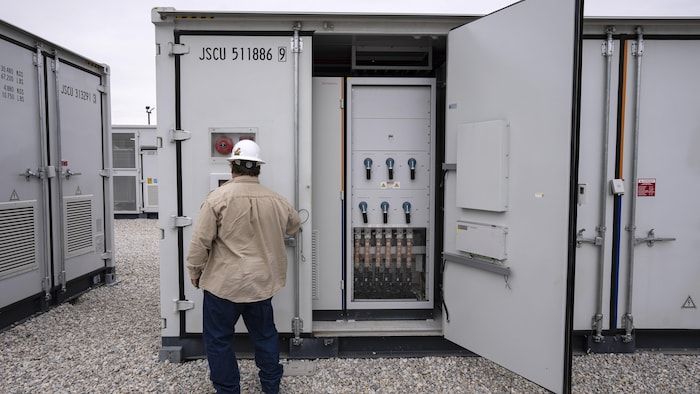
Open in full screen mode
A battery energy storage center in Saginaw, Texas, in 2023.
Photo : AP / Sam Hodde
It is no coincidence that the leader of the House of Representatives, Republican Mike Johnson, close to Trump, has clearly indicated that he wants the new administration to review Joe Biden’s law with a scalpel rather than a sledgehammer
.
Donald Trump’s intentions are cause for concern. With a few strokes of the pen that aim to deconstruct the architecture of climate protection in the United States, he makes all those who are guided by scientific facts tremble.
However, by acting in this way, the new president is perhaps fueled a little by magical thinking.
If he wants to open up as much territory as possible to oil and gas exploration, including the vast wilderness of Alaska’s Arctic National Wildlife Refuge, there is no guarantee that oil and gas companies will be willing to invest that much of silver in complex drilling.
At a recent auction to sell drilling permits in this region, the Interior Department received no bids (New window).
One thing is certain: Donald Trump can ignore scientific reality as much as he wants, nothing will prevent his country – and the Americans – from suffering the worst effects of climate change.

